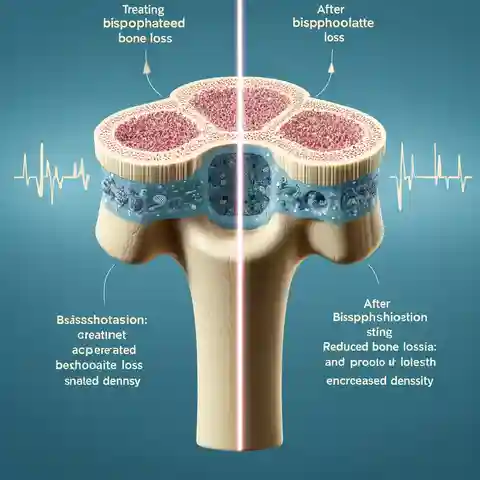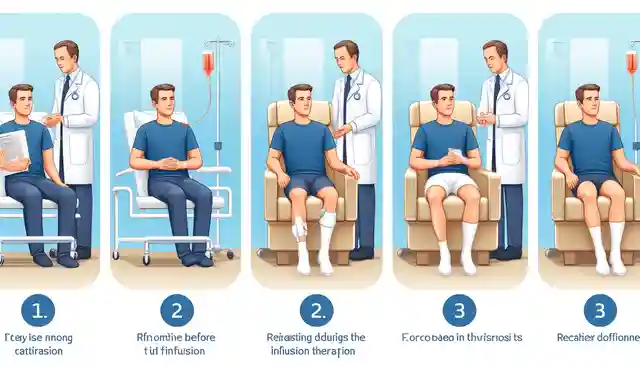Learn about infusion therapy for osteoporosis – how it works, types of medication, benefits, and who it’s best suited for. Explore if it’s the right solution for your bone health.
Do you struggle with fragile bones due to osteoporosis? Infusion therapy for osteoporosis could be a powerful solution. Discover how it works, the different types, benefits, and if it might be right for you.
What is Infusion Therapy for Osteoporosis?
Infusion therapy means getting medicine through a needle or small tube put directly into your vein.
How do infusion treatments work for osteoporosis?

Infusion Therapy for Osteoporosis – An educational image showing the mechanism of bisphosphonates in treating osteoporosis
The most common medications used in infusion therapy for osteoporosis are called bisphosphonates. Here’s how they work:
- Slowing Down Bone Loss: As we age, our bodies naturally break down old bone faster than it can build new bone. Bisphosphonates slow down this process, helping preserve your existing bone structure.
- Building Stronger Bones: Bisphosphonates also help your body form new, healthy bone tissue. This makes your bones denser and less likely to break.
Types of Infusion Therapy for Osteoporosis

Infusion Therapy for Osteoporosis – An informative image showcasing the different types of infusion therapy medications for osteoporosis
Here are the main infusion medications used to treat osteoporosis:
- Zoledronic acid (Reclast): This yearly infusion offers convenience.
- Ibandronate (Boniva): Given every three months.
- Denosumab (Prolia): A different type of medication; an injection given every six months.
Why Choose Infusion Therapy for Osteoporosis?

A visually engaging image that outlines the benefits of choosing infusion therapy for osteoporosis
Infusion therapy might be right for you if:
- You struggle to take pills regularly or have side effects from oral osteoporosis medications.
- You want a treatment with less frequent dosing.
- Your doctor thinks it’s the best option for your specific situation.
Important Note: Always talk to your doctor to decide if infusion therapy for osteoporosis is the right choice for you.
Who Should Consider Infusion Therapy for Osteoporosis?
Infusion therapy could be a good option if:
- You experience side effects that make taking osteoporosis pills difficult.
- You’re at a high risk of breaking a bone.
- Other treatments haven’t been as effective as you’d hoped.
What to Expect Before, During, and After an Infusion

An informative sequence image illustrating what to expect before, during, and after an osteoporosis infusion therapy session
- Before: Let your doctor know about any medical conditions or medications you’re taking.
- During: The infusion itself is quick, and you’ll relax while the medicine is given.
- After: You might feel a little under the weather for a day or two, like having a mild flu. Stay hydrated and let your doctor know if you have any unusual symptoms.
Side Effects of Infusion Therapy for Osteoporosis
It’s important to understand the potential side effects of infusion therapy for osteoporosis. While generally safe, some things to be aware of include:
What’s common, especially at first:
- Feeling under the weather: You might have fever, chills, aches, or tiredness for a few days, like a mild flu.
- Some temporary aches: A few people might feel achy in their bones, joints, or muscles afterwards.
How to manage these:
- Ask your doctor if over-the-counter pain relievers are okay for you.
- Rest and drink plenty of fluids.
- Let your doctor know if things don’t get better within a few days.
Less Common Side Effects:
- Kidney issues: Especially with certain infusion medications, your kidney health might need monitoring.
- Low calcium: Your doctor may recommend a supplement.
- Jaw problems: This is rare, but good dental health is important. Tell your dentist you’re getting infusions.
- Heartbeat changes or eye problems: These are uncommon, but report them to your doctor right away.
Key Things to Remember:
- Everyone’s different: Some people have almost no side effects, others a bit more.
- Severe reactions are very rare under a doctor’s care.
- Tell your doctor about ALL other medicines you take to avoid interactions.
When to Call the Doctor ASAP
- Symptoms that get worse, not better
- Trouble breathing or chest tightness
- Any new, strange pain
- Signs of infection (high fever, etc.)
Most people do well with infusion therapy. The stronger bones you get are usually worth some temporary discomfort. Talking openly with your doctor is the best way to make this treatment work for you!
How Long Does It Take for Infusion Therapy to Work?
- Bisphosphonates: While you might see some bone density improvement quickly, it takes a while to get the full fracture prevention benefits.
- Denosumab: This works quickly, and you’ll usually see noticeable results within months.
Is Infusion Therapy for Osteoporosis Right for Me?
Only you and your doctor can decide the best way to manage your osteoporosis. Here’s how to know if infusions might be worth considering:
- Talk to your doctor: They’ll assess your specific needs and discuss the pros and cons of different treatments.
- Insurance coverage: Check with your insurance company to understand your costs.
- Your preference: Do you prefer less frequent medication schedules?
Alternatives to Infusion Therapy for Osteoporosis
There are other ways to manage osteoporosis:
- Oral medications: Pills are the most common treatment and include options taken daily, weekly, or monthly.
- Injections (non-infusion): Like denosumab (Prolia), given less frequently than pills.
- Hormone therapy (for some women): This helps with bone density but carries other risks to discuss with your doctor.
- Lifestyle changes: Exercise, a healthy diet, and avoiding smoking and excessive alcohol are crucial for strong bones.
Lifestyle Changes to Complement Treatment
Even with powerful treatments like infusion therapy, your everyday habits play a huge role in bone health. Here’s what you can do:
Get Moving: Weight-bearing exercise is like strength training for your bones! Try:
- Brisk walking or jogging
- Dancing
- Exercises with light weights or resistance bands
Fuel Your Bones: Make sure you’re getting:
- Calcium: Dairy, leafy greens, fortified foods
- Vitamin D: Sunlight, supplements if needed
Kick the Habits: Smoking and excessive alcohol weaken bones significantly. Quitting provides benefits beyond just your bones!
Important: Always talk to your doctor before starting new exercise routines, especially after an osteoporosis diagnosis.
Cost Considerations
The cost of infusion therapy for osteoporosis can vary, but it’s important to understand all factors involved. Here’s what to consider:
- Insurance Coverage: Most insurance plans cover some or all of the costs of infusion therapy. Contact your provider to understand your specific coverage and any out-of-pocket expenses.
- Medication Choice: Different infusion medications can have varying costs. Your doctor will help you choose the most appropriate one based on your needs and budget.
- Infusion Center Fees: If your doctor doesn’t perform infusions in their office, the facility administering the treatment may have additional fees.
- Long-term Savings: While there’s an upfront cost to infusion therapy, it’s important to consider the potential savings in the long run. Treating osteoporosis proactively can significantly reduce the costs and risks associated with fractures.
Finding a Qualified Infusion Center
If your doctor doesn’t offer in-office infusions, they can likely refer you to a reputable facility. Here are some additional tips:
Ask Questions: Don’t be afraid to ask the center questions like:
- How experienced is your staff in administering infusion therapy for osteoporosis?
- What is your process for managing potential side effects?
- Do you work with my insurance plan?
Comfort Level: It’s essential to feel comfortable with the facility and staff. You should feel that your questions are answered thoroughly, and the environment is clean and professional.
Convenience: Consider factors like location and appointment availability when making your decision.
Remember: Your doctor is your best resource! They can guide you through the cost considerations and help you find a safe, qualified infusion center if needed.
FAQs: Understanding Infusion Therapy for Osteoporosis
Is infusion therapy the same as getting an IV in the hospital?
While both involve inserting a needle or tube into a vein, infusion therapy for osteoporosis is an outpatient procedure. The medication is specifically for bone health, and the infusion typically takes about 15-30 minutes.
How often would I need to get infusion treatments?
The frequency depends on the medication. Some are given yearly, others every few months. Denosumab is a different type given as an injection every six months.
Are there risks with infusion therapy?
Like any medical treatment, infusion therapy has some potential side effects. Most are mild and temporary, like flu-like symptoms. Your doctor will discuss all possible risks and how to manage them.
If I don’t like needles, is infusion therapy still an option?
Talk to your doctor! The infusion process is quick, and there might be ways to manage any needle anxiety. It’s important to compare this discomfort with the potential benefits of stronger bones.
Will infusion therapy cure my osteoporosis?
Infusion therapy doesn’t cure osteoporosis but is a powerful tool to manage it. It significantly strengthens bones and greatly reduces your fracture risk.
Can I switch to infusion therapy if oral medications aren’t helping?
Definitely discuss this with your doctor! Infusion therapy is often considered when other treatments haven’t provided as much benefit as needed, or if side effects are an issue.
CONCLUSION
Infusion therapy for osteoporosis can be a valuable tool in fighting osteoporosis, but it’s important to weigh the pros and cons. Talk to your doctor to discover the best treatment plan to help you build the strongest, healthiest bones possible.


